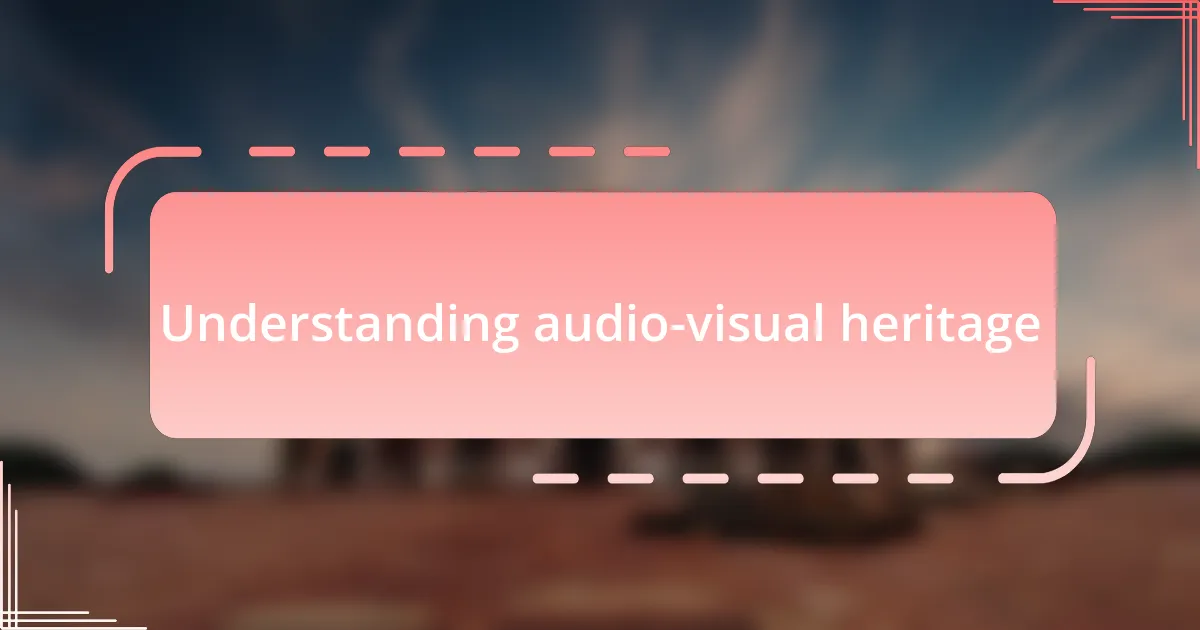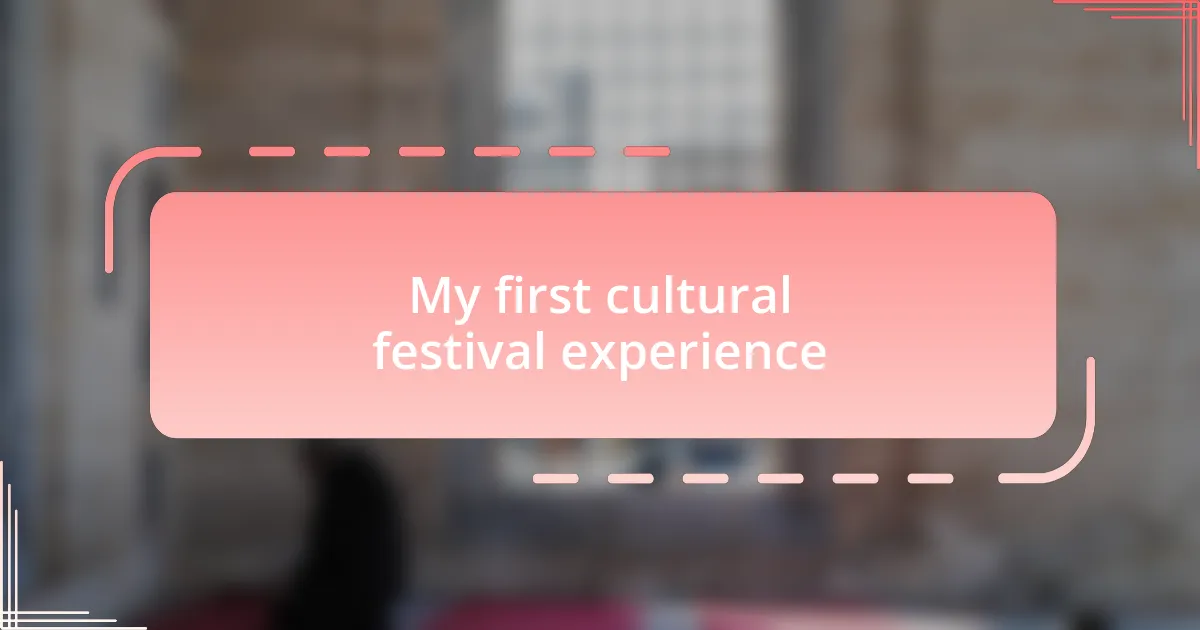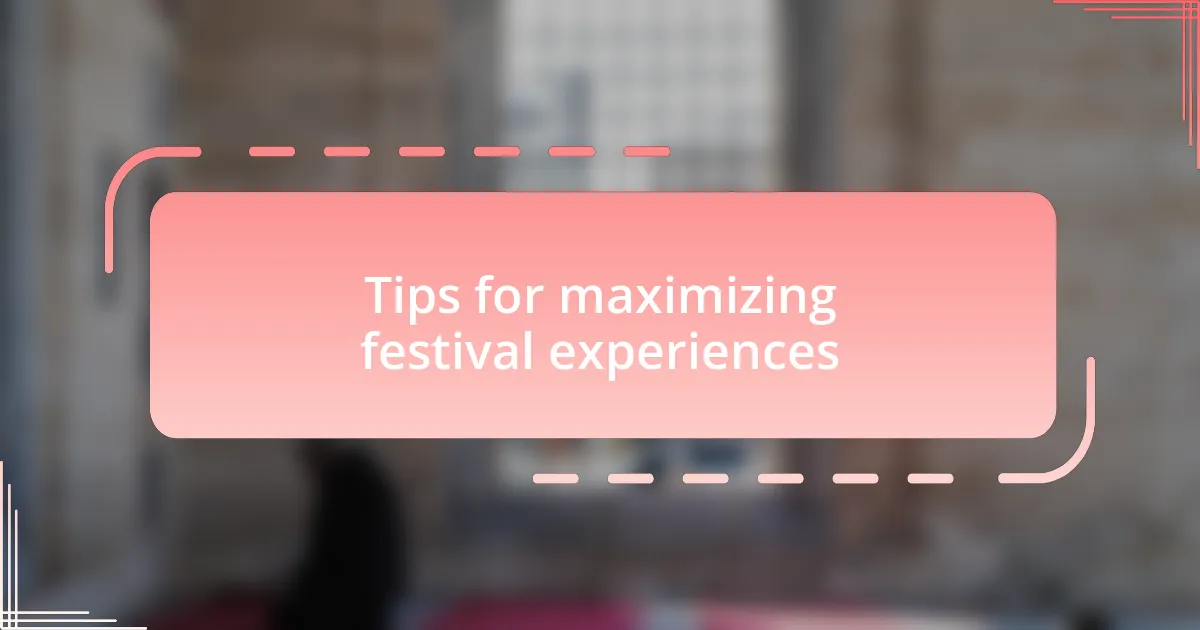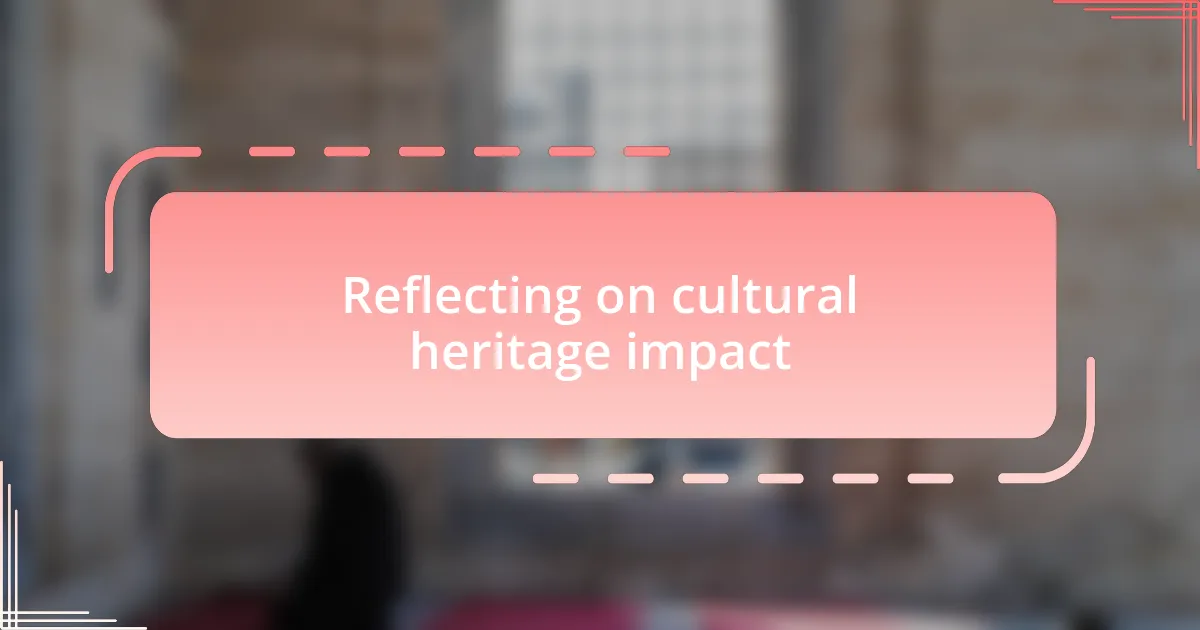Key takeaways:
- Audio-visual heritage, including films and music, preserves cultural history and evokes emotions, fostering connections to past narratives.
- Cultural festivals play a vital role in celebrating diversity, preserving intangible heritage, and creating a sense of community and belonging.
- Engaging with artists and embracing spontaneity during festivals enhances the experience and leads to meaningful interactions.
- Experiencing cultural heritage through food, storytelling, and performances deepens understanding of identity and community.

Understanding audio-visual heritage
Audio-visual heritage encompasses all forms of content that combine sound and imagery, including films, music videos, and radio broadcasts. Reflecting on my experience at a cultural festival, I recall watching an old film projected onto a large screen, the accompanying live music creating a unique atmosphere that transported the audience back in time. Isn’t it fascinating how these elements can evoke emotions and memories, connecting us to different cultures and places?
Delving into the realm of audio-visual heritage raises important questions about preservation. For instance, how do we ensure that these cultural treasures remain accessible for future generations? I remember attending a panel discussion at a festival where experts passionately debated this issue, highlighting the delicate balance between technology and tradition. It made me realize that every film or piece of music is more than just entertainment; it’s a piece of history that tells a story.
On a personal level, I’ve always found that audio-visual materials resonate deeply, sparking my curiosity about the contexts in which they were created. I discovered a local documentary at a festival that showcased the struggles of marginalized communities, leaving me with a profound sense of empathy and a desire to learn more about their narratives. Don’t you think there’s a unique power in how such heritage can foster understanding and acceptance?

Importance of cultural festivals
Cultural festivals serve as vibrant tapestries that weave together diverse traditions, enriching our understanding of humanity. I remember a particularly lively festival where dancers from different countries shared their unique styles, creating a beautiful mosaic of movement and sound. Can you feel how such experiences foster not just appreciation, but a deeper connection among attendees as they witness the richness of global cultures?
In my experience, these festivals also play a crucial role in preserving intangible cultural heritage. One year, I attended a workshop on traditional storytelling, where local storytellers captivated the audience with their narratives. It struck me how these stories carry the voices of generations, ensuring that cultural nuances and values are passed down through time. Isn’t it heartwarming to know that such art forms thrive in contemporary spaces, allowing us to engage with our shared human experience?
Moreover, the communal aspect of cultural festivals can ignite a sense of belonging that transcends boundaries. I once stood in a crowd united by rhythm during a live concert, where everyone was singing along, their voices harmonizing in a way that felt almost magical. This feeling of unity not only strengthens community ties but also creates lasting memories that connect us to both the present and the past. How wonderful is it to experience moments that remind us of our shared cultural heritage?

Types of audio-visual heritage
Audio-visual heritage comes in various forms, reflecting the complexities of culture and history. One striking example is film archives, preserving cinematic gems that not only entertain but also tell the stories of different eras and societies. I still vividly recall watching a classic documentary that transported me back in time, revealing social issues that resonated with my own experiences. Isn’t it fascinating how films can bridge the gap between generations, fostering empathy and understanding?
Another important type is recorded music, which encapsulates the soundscapes of specific cultures. Attending a local music festival, I was drawn to a vibrant performance of traditional folk music. Each note seemed to echo the stories and emotions of the performers, resonating deeply within me. How often do we realize the power of music to connect us to our roots, stirring feelings we thought were long dormant?
Photography and visual art also constitute significant elements of audio-visual heritage. I once spent an afternoon at an exhibit showcasing photographs from past cultural events, each image telling a vivid story of celebration and community. It made me reflect on how visual documentation can preserve moments that evoke nostalgia and pride. Don’t you think there’s something magical in these images that allows us to relive those memories, celebrating the beauty of human expression?

My first cultural festival experience
Attending my first cultural festival was an unforgettable experience that ignited a deep appreciation for diversity in traditions. I remember stepping into the colorful venue, overwhelmed by the sights and sounds of laughter, music, and art swirling around me. It felt as if I had been transported to a different world where every corner held a story just waiting to be discovered.
One moment that stands out was a mesmerizing dance performance that brought together various cultural expressions. The dancers, adorned in vibrant costumes, moved gracefully, and as I watched, I could feel the energy of the audience building. Have you ever felt connected to a moment like that, where art transcends language and speaks directly to your heart? I certainly did, as each movement seemed to narrate a tale of its own, drawing me in and making me feel like a part of something larger than myself.
During a workshop, I tried my hand at traditional crafts under the guidance of local artisans. The rich textures and vibrant colors of the materials connected me to a heritage that felt both new and familiar. It’s amazing how immersing oneself in cultural practices can evoke such a profound sense of belonging. Have you ever lost track of time while learning something that speaks to your soul? I could have spent hours experimenting, feeling the creative spirit flowing through my fingertips.

Key learnings from festivals
Experiencing festivals firsthand taught me the importance of community. I vividly recall joining a group of strangers who quickly became friends as we danced together in unison, celebrating our differences while also recognizing our shared humanity. Have you ever noticed how music has the power to break barriers and bring people together? It truly creates an invisible thread of connection that binds us all, no matter our backgrounds.
One of the most striking lessons was the value of storytelling through art. I encountered an artist who painted murals live, transforming blank walls into vibrant narratives. Each brushstroke revealed layers of culture and history, inviting spectators to reflect on their own experiences. It’s fascinating how visual art can spark dialogue and introspection; don’t you think that seeing stories unfold in front of us makes them all the more relatable?
Finally, I found that immersing myself in unfamiliar culinary traditions expanded my palate and worldview. While savoring dishes from different cultures, I was reminded that food is more than just sustenance; it’s a vehicle for sharing stories and creating memories. Have you ever tasted a dish that transported you to another place? In that moment, every bite became a celebration of heritage, reminding me of the richness that diversity brings to our lives.

Tips for maximizing festival experiences
To fully maximize your festival experience, I recommend arriving early. This way, you can soak in the atmosphere without the crowds pushing you along. I remember walking through an art exhibit one year, admiring each piece closely as the sun rose, casting a golden light over everything. Have you ever felt the magic of a quiet moment before the buzz begins?
Another tip is to engage with the artists directly. I once struck up a conversation with a glassblower who was crafting stunning pieces right before my eyes. Hearing his passion for the craft added an entirely new dimension to my appreciation of the art. When we share experiences with the creators, it turns a mere transaction into a meaningful interaction.
Don’t forget to stay open to spontaneity! One of my favorite memories came from wandering into a pop-up folk music stage. I had no idea what to expect, but I found myself entranced by a group of local musicians playing heartfelt tunes. It reminded me that sometimes the unexpected can offer the most memorable experiences. Have you ever stumbled upon something that changed your perspective just by being in the right place at the right time?

Reflecting on cultural heritage impact
Reflecting on cultural heritage truly deepens our understanding of identity and community. I remember standing amidst a vibrant dance performance at a festival where the movements told stories passed through generations. It struck me how art can encapsulate complex histories, making them accessible and relatable. Have you ever witnessed a performance that made you feel connected to a shared past?
The sensory experiences at cultural festivals can be utterly transformative. One year, the fragrance of spices wafted through the air and drew me to a food stall showcasing traditional dishes. As I tasted a recipe that had been in that family for generations, I felt a sense of continuity, linking my current experience to an ancient practice. Isn’t it fascinating how a simple bite of food can evoke such profound connections to heritage?
Moreover, the conversations sparked at these events can lead to extraordinary insights. I recall chatting with an elder who shared tales of his upbringing in a community with rich traditions. His stories weren’t just about the past; they highlighted the present significance of cultural preservation. The impact of such exchanges often lingers long after the festival ends, making me realize how crucial it is to honor our collective narratives. How do you think your interactions at similar events have shaped your understanding of cultural heritage?